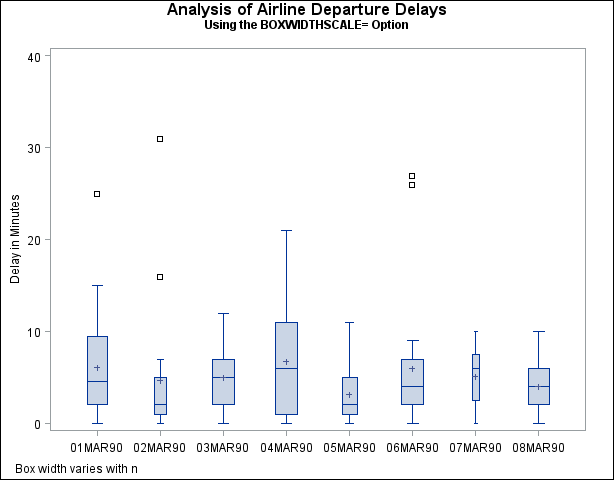The BOXPLOT Procedure
Example 25.5 Creating Box-and-Whiskers Plots with Varying Widths
This example shows how to create a box plot with box-and-whiskers plots whose widths vary proportionately with the group size. The following statements create a SAS data set named Times2 that contains flight departure delays (in minutes) recorded daily for eight consecutive days:
data Times2;
label Delay = 'Delay in Minutes';
informat Day date7. ;
format Day date7. ;
input Day @ ;
do Flight=1 to 25;
input Delay @ ;
output;
end;
datalines;
01MAR90 12 4 2 2 15 8 0 11 0 0
0 12 3 . 2 3 5 0 6 25
7 4 9 5 10
02MAR90 1 . 3 . 0 1 5 0 . .
1 5 7 . 7 2 2 16 2 1
3 1 31 . 0
03MAR90 6 8 4 2 3 2 7 6 11 3
2 7 0 1 10 2 5 12 8 6
2 7 2 4 5
04MAR90 12 6 9 0 15 7 1 1 0 2
5 6 5 14 7 21 8 1 14 3
11 0 1 11 7
05MAR90 2 1 0 4 . 6 2 2 1 4
1 11 . 1 0 . 5 5 . 2
3 6 6 4 0
06MAR90 8 6 5 2 9 7 4 2 5 1
2 2 4 2 5 1 3 9 7 8
1 0 4 26 27
07MAR90 9 6 6 2 7 8 . . 10 8
0 2 4 3 . . . 7 . 6
4 0 . . .
08MAR90 1 6 6 2 8 8 5 3 5 0
8 2 4 2 5 1 6 4 5 10
2 0 4 1 1
;
The following statements create a box plot with varying box widths:
title 'Analysis of Airline Departure Delays';
title2 'Using the BOXWIDTHSCALE= Option';
proc boxplot data=Times2;
plot Delay*Day /
nohlabel
boxstyle = schematic
boxwidthscale = 1
bwslegend;
run;
The BOXWIDTHSCALE=value option specifies that the widths of the box-and-whiskers plots vary in proportion to a particular function of the group size  . The function is determined by value and is identified on the box plot with a legend if the BWSLEGEND option is specified. The BOXWIDTHSCALE= option is useful in situations where the group sizes vary widely.
. The function is determined by value and is identified on the box plot with a legend if the BWSLEGEND option is specified. The BOXWIDTHSCALE= option is useful in situations where the group sizes vary widely.
Output 25.5.1 shows the resulting box plot.

